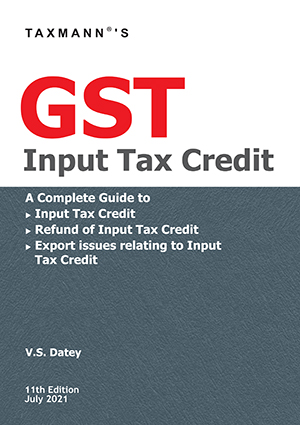Restrictions on Availment of Input Tax Credit
- Blog|GST & Customs|
- 3 Min Read
- By Taxmann
- |
- Last Updated on 23 November, 2021
Normally, a registered person is entitled to claim input tax credit of taxes paid by him on inward supplies. A registered person can claim the credit of taxes paid on procurement of goods or services which are used or intended to be used for the purpose of business if following conditions are satisfied:
1. The recipient has a valid tax paid document
The recipient can claim the input tax credit only if he is in possession of a valid tax paid document issued by a registered supplier. The eligible input tax credit in a financial year can be claimed on or before the due date of furnishing of return for the month of September of subsequent financial year to which such invoice (or invoice relating to such debit note) pertains or furnishing of the relevant annual return, whichever is earlier.
2. Goods or Services are received
The Input tax credit is allowed when the recipient, or any other person as directed by the recipient, i.e., agent or job worker, etc., receives such goods or services. If advance payment has been made by him for goods or services, then input tax credit shall not be allowed to him until goods or services are received. In case of receipt of goods against an invoice in lots or instalments, the credit will be available only on receipt of last lot or instalment of goods.
3. Taxes are paid to Govt.
Input tax credit is allowed provided the taxes charged in respect of such supply are deposited by the supplier to the credit of the Government. The recipient of goods and services can take the credit on provisional basis which will become final once the supplier pays the taxes to the government.
4. Return is Furnished
Filing of GST return is mandatory for the recipient to claim the credit of input tax paid on goods or services supplied to him.
5. Payment within 180 days
The recipient shall be liable to reverse the input tax credit, already availed by him, if he does not make the payment to the supplier towards the value of goods or services along with tax payable thereon within a period of 180 days. On reversal of input tax credit, the recipient shall also be liable to pay interest on the amount of credit so reversed. The recipient can re-avail the input tax credit when he makes the payment towards the value of goods or services along with tax payable thereon.
6. Depreciation shall not be claimed on ITC component
A registered person claiming credit of taxes paid in respect of capital goods (including plant and machinery) shall not add such input tax component in the cost of asset while claiming depreciation on it under Income-tax Act. But these conditions are not sufficient to cover cases where details of outward supplies are not furnished by the suppliers in their GST Returns. If recipient has fulfilled all conditions but supplier failed to upload details of outward supplies, the invoices would not appear in GSTR-2A.
Thus, GST Council in its 37th meeting held today at Goa, recommended to impose certain restrictions on availment of Input Tax Credit by the recipients in cases where details of outward supplies are not furnished by the suppliers. In order to nudge taxpayers to timely file their statement of outward supplies, GST Council proposed to impose certain restrictions on availment of input tax credit by the recipients in cases where details of outward supplies are not furnished by the suppliers.
Disclaimer: The content/information published on the website is only for general information of the user and shall not be construed as legal advice. While the Taxmann has exercised reasonable efforts to ensure the veracity of information/content published, Taxmann shall be under no liability in any manner whatsoever for incorrect information, if any.

Taxmann Publications has a dedicated in-house Research & Editorial Team. This team consists of a team of Chartered Accountants, Company Secretaries, and Lawyers. This team works under the guidance and supervision of editor-in-chief Mr Rakesh Bhargava.
The Research and Editorial Team is responsible for developing reliable and accurate content for the readers. The team follows the six-sigma approach to achieve the benchmark of zero error in its publications and research platforms. The team ensures that the following publication guidelines are thoroughly followed while developing the content:
- The statutory material is obtained only from the authorized and reliable sources
- All the latest developments in the judicial and legislative fields are covered
- Prepare the analytical write-ups on current, controversial, and important issues to help the readers to understand the concept and its implications
- Every content published by Taxmann is complete, accurate and lucid
- All evidence-based statements are supported with proper reference to Section, Circular No., Notification No. or citations
- The golden rules of grammar, style and consistency are thoroughly followed
- Font and size that’s easy to read and remain consistent across all imprint and digital publications are applied




 CA | CS | CMA
CA | CS | CMA
